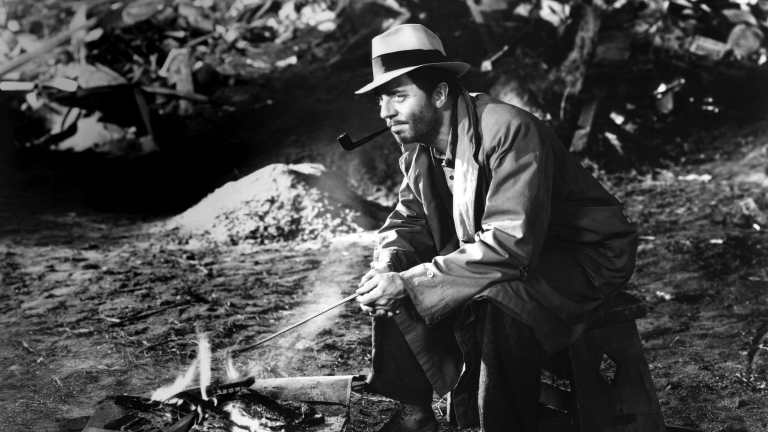It’s a pity the Bullocks, the wealthy family at the center of “My Man Godfrey,” never came across Jack London’s definition of charity. London, the author of “Call of the Wild” and “White Fang,” naturally described the concept in canine terms. “A bone to the dog is not charity. Charity is the bone shared with the dog, when you are just as hungry as the dog.”
The fashionable Bullocks do not go hungry, but nonetheless, they want to give out bones. Therefore, they attend a scavenger hunt at the Waldorf Ritz hotel. The proceeds from the event go to charity, but nevertheless, it develops into a competition, with the participants vying for bragging rights. Yet, winning is difficult because the contestants must find an animate “forgotten man.” Desperate to come out on top, Cornelia Bullock goes to the city dump and finds Godfrey living in squalor. She convinces him to go back to the hotel with her, and she triumphs. Then, she decides to throw another bone. The family’s butler has just quit, so she offers Godfrey the job. He accepts, but Cornelia’s kindness fails to make his life easier. Instead, his sojourn at the Bullocks’ Park Avenue mansion devolves into a sidesplitting sequence of shenanigans. Throughout all these pratfalls, director Gregory La Cava considers the pitfalls of proffering charity.
Most of La Cava’s commentary is tied to American anxieties about the Great Depression. After all, the film was made in 1936, at the height of the crisis. Yet, his comedy is timeless. When an employee at any establishment in any era tells a new hire that “people are dropping in and out” of his position “all the time,” it is never a good sign. Thus, when the maid informs Godfrey that the family has been through a surfeit of servants, he has reason to worry. It quickly becomes apparent why people are turning down his job despite the Depression—the Bullocks are bonkers. Cornelia is fond of booze and breaks windows along Fifth Avenue when she is intoxicated. Cornelia’s sister, Irene, also embarrasses herself under the influence. During Godfrey’s first day at work, she rides a horse into the library. The girls’ father is too preoccupied with his stocks to look after them, and their mother is too busy looking at Carlo, a dashing Italian she has adopted as a “protégé.” Cornelia becomes jealous that her mother is mentoring a man, so she determines to take on Godfrey as her protégé.
She hits a surprising number of snags in executing her plan. Most notably, Godfrey will not submit to night school, held under Cornelia’s covers. Godfrey’s reluctance to romance Cornelia, however, goes beyond the bedroom. Even as her protégé, he wants to preserve his independence. In spite of his outlandish situation, he still subscribes to the credo expressed in the Declaration of Independence, the belief that every person has the right to “life, liberty and the pursuit of happiness.” What kind of life does Godfrey lead attending to the Bullocks? How can he possess “liberty” as a protégé? Even if he were happy within the Bullock household, how can he pursue any goal if he is constantly dependent on their charity?
These questions are not only at the core of “My Man Godfrey,” but are also crucial to understanding the Great Depression. In his first inaugural address, President Franklin D. Roosevelt sought to reassure to a nation in distress. After boldly declaring that “the only thing we have to fear is fear itself,” he asserted that the Depression was insignificant “compared with the perils which our forefathers conquered” and that “old and precious moral values” would endure. Yet, how can Americans seek “life, liberty and the pursuit of happiness” if many of them rely on the government for work? Roosevelt resolved this paradox by noting that he was treating the crisis “as we would treat the emergency of a war.” In short, desperate times call for desperate measures.
Godfrey is willing to take desperate measures to stay employed because putting up with the Bullocks is “more desirable than living in a packing case on the city dump.” Therefore, he weathers Irene’s envious attempts to fire him and withstands Cornelia’s capricious whims. Similarly, the speaker in E.Y. Harburg’s song “Brother, Can You Spare a Dime?” also goes to extreme ends to survive. While Godfrey becomes involved in antics, Harburg’s man becomes involved in an even less distinguished vocation—he begs. Impassioned, he implores passerby, “Say, don’t you remember? You called me Al. It was Al all the time. Say, don’t you remember, I’m your pal. Brother, can you spare a dime?”
La Cava and Harburg share another common concern besides the degradation of dependency. Both realize that charity can be temporary. The Bullocks or the government can retrieve their bones at any time. As Harburg’s speaker states, “Once I built a tower. Now it’s done.” Therefore, he must ask once again, “Brother, can you spare a dime?” What happens to him when the Depression is no longer a national emergency?
Over the course of La Cava’s film, Godfrey’s future is assured. He progresses from Cornelia’s protégé to her paramour. Yet, La Cava does not shirk away from the issues Harburg raises. At one point, Godfrey leaves the Bullock home and returns to the dump. His old compatriots have yet to be picked up as proteges, and they are still penniless. The Bullocks may be crazy, but when their behavior is put into the context of the Depression’s devastation, they seem only mildly eccentric. The entire world is insane if people are treated as trash. “My Man Godfrey” may be hysterical, but between hijinks, it confronts realities that are far from hilarious.
Contact Amir Abou-Jaoude at amir2 ‘at’ stanford.edu.
